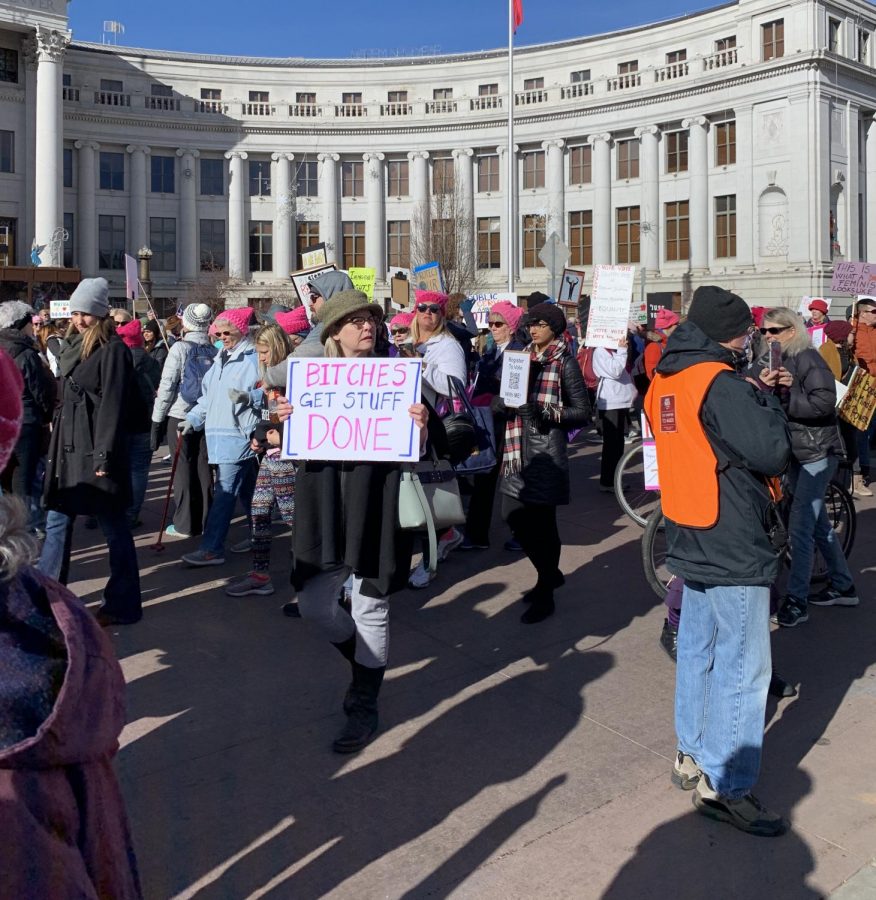Understanding Patriarchy
Ever since the inauguration of Donald Trump in 2016, those fighting for gender equality take to the streets during the annual Women’s March.
Merriam Webster dictionary defines the word “patriarchy” as follows: “a social organization marked by the supremacy of the father in the clan or family, the legal dependence of wives and children, and the reckoning of descent and inheritance in the male line.” Wikipedia expands the definition a bit more: “patriarchy is a social system in which men hold primary power and predominate in roles of political leadership, moral authority, social privilege and control of property.” This definition does a much better job of defining patriarchy as used in discussions of social dynamics. bell hooks, the author of the essay “Understanding Patriarchy,” defines patriarchy as “the single most life-threatening social disease assaulting the male body and spirit in our nation.” bell hooks is a pen name the author uses, preferring it to be lowercase in order to emphasize the “substance of books, not who I am.”
With all three of these definitions, one can get a pretty good idea of what feminists are talking about when making remarks about “the patriarchy.” Modern-day patriarchy is not as simple as it might seem when anthropologists classify past civilizations as patriarchal or matriarchal. Instead, it has now become an implicit system of societal hierarchy.
As hooks notes, the word patriarchy is often misunderstood in conversations about society because it is so quickly discounted as “anti-men feminist rhetoric.” hooks writes, “nothing discounts the old antifeminist projection of men as all-powerful more than their basic ignorance of a major facet of the political system that shapes and informs male identity and sense of self from birth until death.” Gendered existence is a result of the patriarchy; it defines what is masculine and feminine, what men and women should and should not do and how men and women interact with each other and the world. The Patriarchy lays the foundation for these identities and the entire idea of feminism necessary to dismantle the system of patriarchy.
Often feminism is difficult to discuss because so many people start the conversation with a baseline misunderstanding of feminism and patriarchy as terms. Many people believe that feminism is only about women and women’s issues when the reality is that the movement aims to destroy the oppressive system that we all live under and that impacts us all negatively. This system is upheld by women as much as it is by men.
In the essay, hooks describes the role that many women have in teaching and enforcing gender roles to children. hooks explains that “the contemporary presence of female-headed households has led many people to assume that children in these households are not learning patriarchal values because no male is present. They assume that men are the sole teachers of patriarchal thinking. Yet many female-headed households endorse and promote patriarchal thinking with far greater passion than two-parent households.” Women are socialized to be complacent, uphold the patriarchy, reinforce everything they were taught as children, and not question the validity of this system. “We need to highlight the role women play in perpetuating and sustaining patriarchal culture so that we will recognize patriarchy as a system women and men support equally, even if men receive more rewards from that system. Dismantling and changing patriarchal culture is work that men and women must do together. Clearly, we cannot dismantle a system as long as we engage in collective denial about its impact on our lives.”
This is a system that affects everyone; it informs how our society functions. No matter how far we move away from the patriarchy, it comes through in very slight ways. In the wage gap, in sex work, in our everyday language. The patriarchy is alive and well, but it is becoming harder to recognize; this causes many women’s experiences with misogyny and the patriarchy to be swept aside.
Anyone who’s ever been active on social media has undoubtedly seen or been involved in the discourse regarding feminism, what it means and what its purpose is. However, many of these online conversations start with a misunderstanding of the ideas being discussed. MRAs or “Men’s Rights Activists” are an example of this phenomenon. Often in any conversation in which the terms “feminism,” “patriarchy” or “gender roles” are brought up, these people will immediately assume that all feminists hate men and don’t care to do anything about the myriad of issues facing men on a societal level.
This rhetoric comes from a patriarchal idea that hooks describes in her essay. She talks about the way that the patriarchy defines being a man as follows: “Men cannot be men, only eunuchs if they are not in control. Both the feminist and antifeminist views are rooted in a peculiarly modern American perception that to be a man means to be at the controls and at all times to feel yourself in control.” It is the implicit understanding of masculinity as an absolute seizure of control and because any attempt to challenge the patriarchy challenges that control, there is often a very reactionary response in which those who actively (if unintentionally) support and uphold the patriarchy want to remain in power and keep their privileges (that they so often deny the existence of in the first place).
The reality that many misunderstand the system of patriarchy fails to recognize that the privileges and power awarded to men as a result of the patriarchy are only one side of a double-edged sword. Often in an attempt to devalue and undermine the reality of female oppression, these people will list a plethora of issues facing men and men only. These are things such as ridiculously high rates of suicide, examples of men losing custody cases, statistics about men being disregarded as victims of sexual assaults and much more.
What they fail to realize, however, is that all of those issues stem directly from the patriarchal system that feminists aim to dismantle. Male suicide rates are so high because the patriarchy denies men the right to express their emotions. Men often lose custody battles because women have been socialized to be caretakers and are often subconsciously recognized as such, even if the evidence is against them. And male victims are so often discounted because we live in a society that views men as being in control and refuses to acknowledge that they too can be violated. This once again reveals that no matter who you are, the patriarchy negatively impacts your life.
The essence of hooks’ essay is to highlight that the gender binary created by society simply exists to impose roles on specific people and that to end oppression caused by the patriarchy, we, as a society, need to name the problem. It’s essential to understand patriarchy as a system to end the suffering caused by it.

Amaya Brooks is a senior this year at Boulder High and a new addition to The Owl’s staff. She recently took an interest in journalism and hopes to explore the world of reporting more deeply this year. She looks forward to the new opportunities, skills and ideas that working as a staff writer on The Owl will give her and is excited to watch how the publication will adapt to the new world of masks and social distancing. Although a very opinionated person, she has no strong preference for green or purple grapes. Her only condition in regards to the fruit is that they aren’t mushy. Beyond that, she can often be found writing in her journal, attempting a new skill (this summer it was skateboarding),...

Aurora is a senior at Boulder High School this year. She is very passionate about social and environmental justice issues and joined The Owl as a way to find a voice for that type of activism. She is very interested in journalism as a prospective career choice. Aurora hopes to bring new perspectives to the Boulder High community and help to start difficult conversations. Aurora is also a member of NAHS, and you can find her doing various forms of art such as pottery, drawing, and painting. In her free time, you can find Aurora in a thrift store buying even more clothing to add to her overflowing closets (she has 2), working at your local coffee shop, and skateboarding (mostly falling). As a creative...



Emrys Jacobs • Jul 22, 2021 at 10:01 pm
WOW! Profound writing! great summary and definitions! What a fantastic synopsis of the bell hooks article. While I didn’t learn much I didn’t already know (as an active feminist to equalize power differentials) I know the beings I am sharing this with will! big hearts and lots of love and light your way. Be filled with loving kindness, Be happy and at peace and Be free from suffering, Be healthy and strong!!!!!!
Lindsay Cook • Dec 14, 2020 at 8:14 am
This was a great in depth look at feminism and the patriarchy. I thought your explanation of patriarchy as a “double edged sword” was very accurate, and really paints a picture of the patriarchy as something we are all victims and perpetrators of. I’d be very interested to read “Understanding Patriarchy” by bell hooks to learn more about I can recognizes myself and others perpetrating a patriarchal system. I loved this article!
Eli Heart • Dec 8, 2020 at 9:23 pm
Wow. This piece really interested me and made me think because of the ways that you explained patriarchy that I had never heard before. It was very novel to me that women have a role in the perpetuation of patriarchy as well ,and that gives me more hope in the pursuit of destroying the patriarchy. The reason it gives me more hope is because men feel vulnerable— which, as you said, is something the patriarchy doesnt allow— when they are called out for their toxicity and things like that, so if they were to be shown more so that it is a universal problem than their problem alone, they might be more willing to commit to change. Thank you for the enlightening article!!
Caris Mullen • Dec 8, 2020 at 6:29 pm
This whole piece was so interesting and really opened my mind and made me think differently about patriarchy. I had never really thought about how huge the effect of patriarchy is. Your point about it affecting feminism was so interesting, and so true, as well as the idea that the system is upheld by men and women. Patriarchy has so many misconceptions and I held a lot of them. This piece was really enlightening and taught me so much.
Caris Mullen • Dec 8, 2020 at 6:28 pm
This whole piece was so interesting and really opened my mind and made me think differently about patriarchy. I had never really thought about how huge the affect of patriarchy is. Your point about it affecting feminism was so interesting, and so true, as well as the idea that the system is upheld by men and women. Patriarchy has so many misconceptions and I held a lot of them. This piece was really enlightening and taught me so much.
Jonathan Wright • Dec 4, 2020 at 12:54 pm
I thought it was very interesting when you pointed out the many of the ills cited by MRAs are also because of the patriarchal system. I hadn’t ever really thought about it in that light.